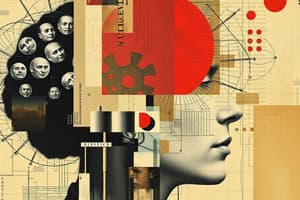Podcast
Questions and Answers
Artificial Intelligence has the ability to learn from past mistakes.
Artificial Intelligence has the ability to learn from past mistakes.
True (A)
Empirical research in AI refers to using established logical steps for problem-solving.
Empirical research in AI refers to using established logical steps for problem-solving.
False (B)
The ability to think, learn, and understand is not considered a part of intelligence in AI.
The ability to think, learn, and understand is not considered a part of intelligence in AI.
False (B)
Artificial Intelligence is defined solely by its capacity for logical reasoning.
Artificial Intelligence is defined solely by its capacity for logical reasoning.
The philosophy of intelligence includes aspects of emotional knowledge and memory.
The philosophy of intelligence includes aspects of emotional knowledge and memory.
Artificial intelligent programs always use sequential steps to reach a solution.
Artificial intelligent programs always use sequential steps to reach a solution.
Chess is a good example of a program that showcases the capabilities of artificial intelligence.
Chess is a good example of a program that showcases the capabilities of artificial intelligence.
Artificial intelligent programs utilize empirical research methods to form their knowledge base.
Artificial intelligent programs utilize empirical research methods to form their knowledge base.
It is acceptable for artificial intelligent programs to provide solutions even if the data is incomplete.
It is acceptable for artificial intelligent programs to provide solutions even if the data is incomplete.
Artificial intelligent programs require the integration of all available information to provide realistic conclusions.
Artificial intelligent programs require the integration of all available information to provide realistic conclusions.
Flashcards are hidden until you start studying
Study Notes
Artificial Intelligence (AI)
- AI simulates human mental abilities and work patterns, emphasizing learning and reacting to unforeseen situations.
- AI aims to create systems that can perform human-like functions like learning languages, completing tasks, and understanding.
Philosophy of Intelligence
- Intelligence is complex and can be defined in various ways, including logic, abstract thought, understanding, self-awareness, communication, learning, emotional knowledge, memory, planning, creativity, and problem-solving.
- Intelligence is the ability to perceive and retain information as knowledge, applying it to itself or other knowledge for creating understanding models.
- Intelligence enables applying learned information to new situations and creating new outcomes.
AI Properties
- Learning ability: AI programs learn through observation, relying on machine learning strategies to continuously improve performance by analyzing previous mistakes.
- Empirical research: AI programs tackle problems without predefined steps, using empirical methods to discover solutions.
- Knowledge representation: AI programs utilize symbolic representation to express information and use empirical research for finding solutions.
- Data unconfirmed or incomplete: AI programs are designed to handle incomplete or uncertain data, providing solutions even when information is lacking.
Applications of AI
- Computer science
- Finance
- Hospitals and medicine
- Heavy industry
- Online and telephone customer service
- Transportation
- Telecommunications maintenance
- Toys and games
- Music
- Aviation
- News, publishing, and writing
Characteristics of AI Languages
- Viability knowledge representation: Special rules are used to describe knowledge (facts, relations, rules, and frames).
- Symbolic processing: AI languages can handle symbols and shapes.
- Flexibility of control: AI languages offer flexible control compared to traditional languages, allowing for more efficient implementation.
AI Problems
- Finding, logical thinking, and problem-solving: AI research focuses on algorithms that mimic sequential logical thinking for problem-solving, including puzzles, board games, and logic-based conclusions.
- Supervised learning: This includes classification (determining category based on models) and regression (discovering input-output relationships from data).
- Natural language processing: AI aims to enable machines to understand and process human languages, with applications in information retrieval and text analysis.
- Movement and change: Robotics closely links with AI, requiring intelligent robots to handle tasks like manipulation, navigation, localization, mapping, and movement planning.
- Perception: Machine perception involves using sensors (cameras, microphones, sonar) to analyze aspects of the world. This includes computer vision, speech recognition, and object identification.
Intelligent Measures
- Turing test: This proposes a test of intelligence by observing a machine's ability to behave indistinguishably from a human in a conversation.
- Expert Turing tests: These evaluate AI based on specific tasks like chemistry, handwriting recognition, and games.
- Intelligent measures classification: AI test results are categorized based on performance:
- Optimization: The best possible performance.
- Extraordinary human: Performance surpassing human capabilities.
- Above human: Performance exceeding most humans.
- Below human: Performance inferior to most humans.
Why Study AI
- Technological singularity: Some futurists predict AI surpassing human capabilities, leading to rapid technological advancements and a fundamental shift in humanity's future.
- Transhumanism: AI's potential to merge with humans, creating cyborgs with enhanced capabilities.
Studying That Suits You
Use AI to generate personalized quizzes and flashcards to suit your learning preferences.




